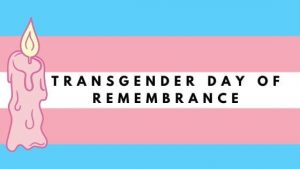Dr Chiara Beccalossi
In the UK, as in many other parts of the world, November is the Transgender Awareness Month – a month dedicated to raising awareness of transgender people and their lives. It reaches its height on 20 November, which is Transgender Day of Remembrance (TDoR). On this day, the LGBT+ community and their allies gather together to honour the memory of those who have lost their lives to transphobia and discrimination.
Last week, the Students Union LGBT+ at the University of Lincoln organised two events on 20 November. At 1pm, LGBT+ students, staff and their allies met outside the SU reception and marched up the hill. At 6pm, students and staff members met again in a packed room at the Isaac Newton Building to honour victims of transphobia and reflect on the challenges ahead. These events were organised and led by students, who gave moving and inspiring talks.
Transgender Day of Remembrance was founded in 1999 by Gwendolyn Ann Smith, a transgender woman who wanted to honour Rita Hester’s memory, an African American transgender woman who was murdered in Allston, Massachusetts (US) on November 1998. It has slowly evolved from this local commemoration to an international day of action. By 2010, TDoR was being observed in over 185 cities in more than 20 countries. The names of those who lost their lives during the past year are generally read out and the commemoration can also include other actions, including candlelight vigils, dedicated church services, marches, art shows, food drives and film screenings.
Official data says that 331 trans and gender diverse people have been murdered globally between November 2018 and November 2019, mostly trans women of colour. While most murders were in South America, the UK has not been exempt; in the past year two trans women, Naomi Hersi and Amy Griffith, were murdered. Of course, the official figures do not include unreported cases, nor does the report include the number suicides amongst the trans community. Sadly, the percentage of suicide among trans and gender diverse people is high. According to Stonewall, more than one in four (27 per cent) young trans people have attempted suicide and 89 per cent have thought about it.
It’s important for students and staff, LGBT+ people and their allies to come together to raise awareness, but not only on dedicated days. Trans and gender diverse people face prejudice and harassment every day. In the UK, hate crimes and transphobic harassment have increased dramatically in the last two years. We need to create a society where everyone is free to be themselves, without worrying about prosecution, harassment and bullying on a daily basis.
It is easy to feel powerless when you are alone, but as our students showed last week, together we can make a difference. We can definitely challenge transphobia, and any kind of discrimination, individually, but as history teaches us, when people come together they can make a difference.
